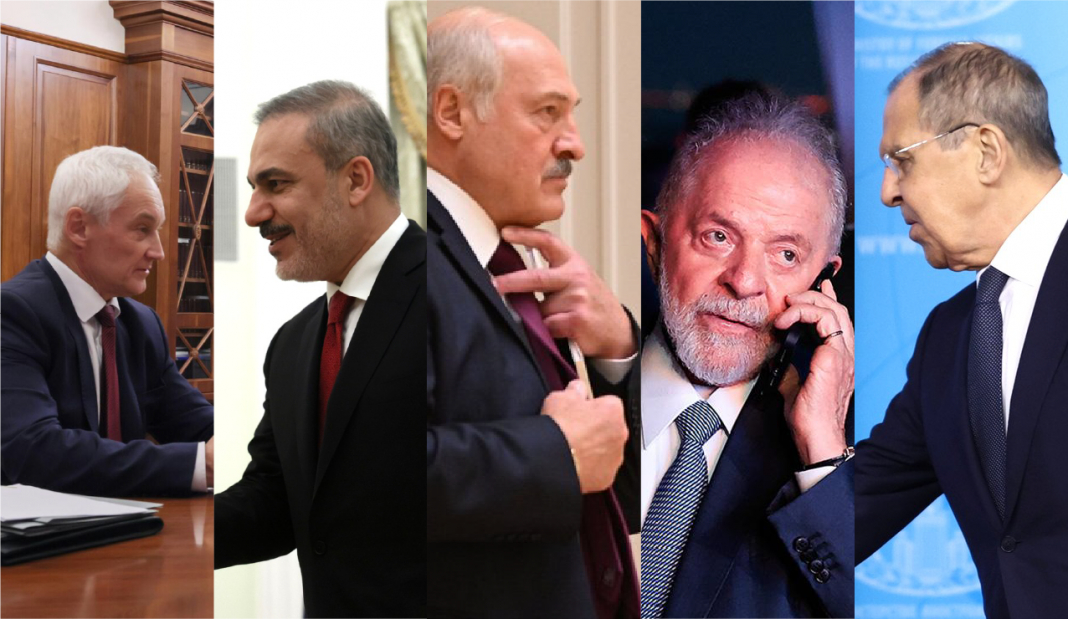This report presents key events that had an important impact on political, economic and social processes inside Russia.
Based on the results of the past week, the following trends can be identified in the following thesis:
- In the run-up to the “Peace Summit,” Vladimir Putin held a number of meetings and phone calls with individual leaders of the “Global South,” resulting in a strengthened unified position both with respect to attempts to form peace proposals on Ukraine and to build a unified position with respect to the West. Undoubtedly, this approach once again demonstrated the existence of a deep rift between the West and the East, and also demonstrated the readiness of the Global South to build further confrontation with Washington and Brussels.
- Putin’s interest in the situation in the war zone is understandable: for him, the success or failure of Russian troops is a factor in weakening or strengthening the negotiating position in the upcoming discussion of the conditions for ending the war. What is important in this situation is that Russia is preparing for a possible counteroffensive by the Ukrainian armed forces, and Putin needs to understand the degree of readiness of certain parts of the front and the possibilities for repulsing the actions of the Ukrainian command. It is also important for him to understand the possible actions of the AFU under the conditions of new equipment and mobilization of human resources. Not by chance, according to the latest data, Putin has strengthened the presence of Russian troops in the Ukrainian direction by 250 – 300 thousand people, as well as forced the defense sector to work at the limit of its capabilities.
- In fact, by voicing new conditions for the cessation of hostilities in Ukraine, Putin has decided to declare a new ultimatum to the West. He is raising the stakes in the diplomatic game. If earlier Putin offered as a condition for peace talks Ukraine’s agreement to lose sovereignty over Crimea and the occupied territories, now he insists on the withdrawal of the AFU beyond the administrative line of Luhansk, Donetsk, Zaporizhzhya and Kherson regions. In parallel, Putin recalled that in March 2022 it was only about recognizing the independence of the so-called “DNR” and “LNR”, as well as guarantees of a land corridor to Crimea. Thus, he makes it clear that Ukraine, by dragging out the negotiation process, will face a constant increase in the stakes from Russia.
This digest examines the following issues that were most relevant to Russia between June 10th and June 16th:
1. Vladimir Putin’s phone conversation with Brazilian President Luiz Inacio Lula da Silva;
2. Vladimir Putin’s meeting with Foreign Minister Turkiye Hakan Fidan;
3. Meeting with the Minister of Defense, Chief of the General Staff and commanders of troops of military districts;
4. telephone conversation between Vladimir Putin and President of Belarus Alexander Lukashenko;
5. Vladimir Putin’s telephone conversation with Mohammad Mokhber, Acting Head of the Executive Branch of the Islamic Republic of Iran;
6. Vladimir Putin’s meeting with the leadership of the Russian Foreign Ministry;
This Content Is Only For Subscribers
- Vladimir Putin’s telephone conversation with Brazilian President Luiz Inacio Lula da Silva.
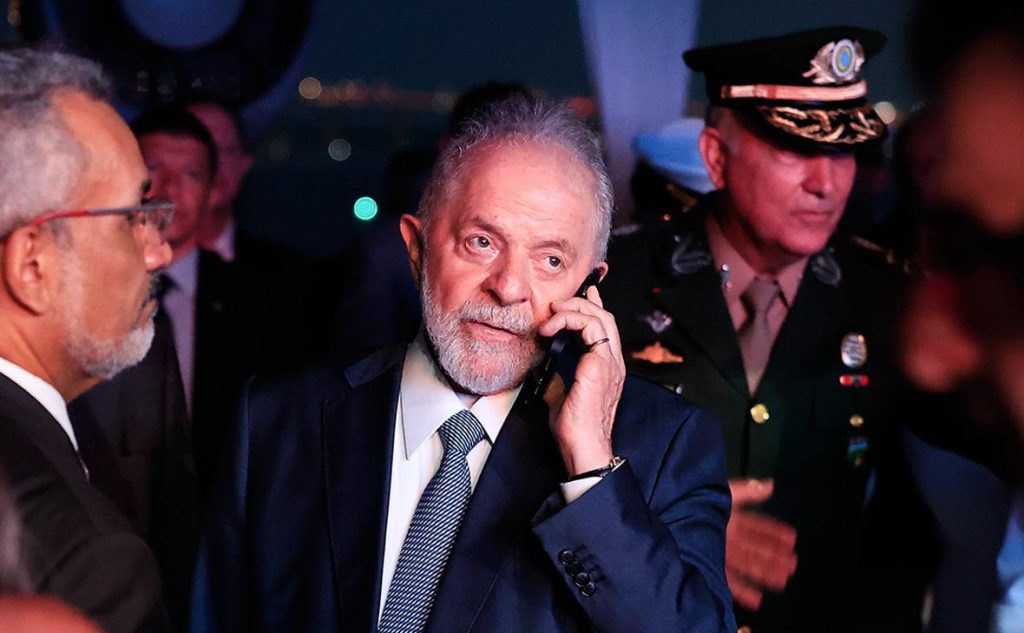
On Monday, June 10, Vladimir Putin held a telephone conversation with Brazilian President Luiz Inacio Lula da Silva. According to the official press release, the conversation took place at the initiative of the Russian side. During the conversation, the parties expressed interest in further deepening the successfully developing strategic partnership between Russia and Brazil in all major areas, and agreed to continue close cooperation between the two countries, taking into account the presidency of Russia in BRICS and Brazil in the G20 this year.
At the same time, the parties paid special attention to the situation around Ukraine. It is noted that the Russian President outlined the fundamental approaches of the Russian side in connection with the “Peace Summit”, which was held in Switzerland on June 15-16. It is also noted that the Brazilian President outlined the desire to contribute to the search for options for a peaceful settlement of the Russian-Ukrainian war, which is reflected in the well-known joint initiative of Brazil and China.
Outcomes/Predictions:
For Russia, relations with Brazil as a key player in BRICS are extremely important: Brazil’s position allows it to significantly influence the situation in Latin America as a whole. Luiz Ignacio Lula da Silva as an experienced politician knows how to prioritize: he is not a pro-Russian figure, but he needs the Russia-China factor to actively resist pressure from the US and transnational corporations, which traditionally have a strong influence on the situation in the region. It was important for Putin to get from Lula da Silva his principled position on the “Peace Summit” in Switzerland, and in this respect the position of the Brazilian president fully satisfied the ambitions of the Russian leader. Brazil seems to have clearly defined its geopolitical positioning, fitting into the concept of the “Global South” and not inclined to compromises offered by the United States.
- Vladimir Putin’s meeting with Foreign Minister Turkiye Hakan Fidan
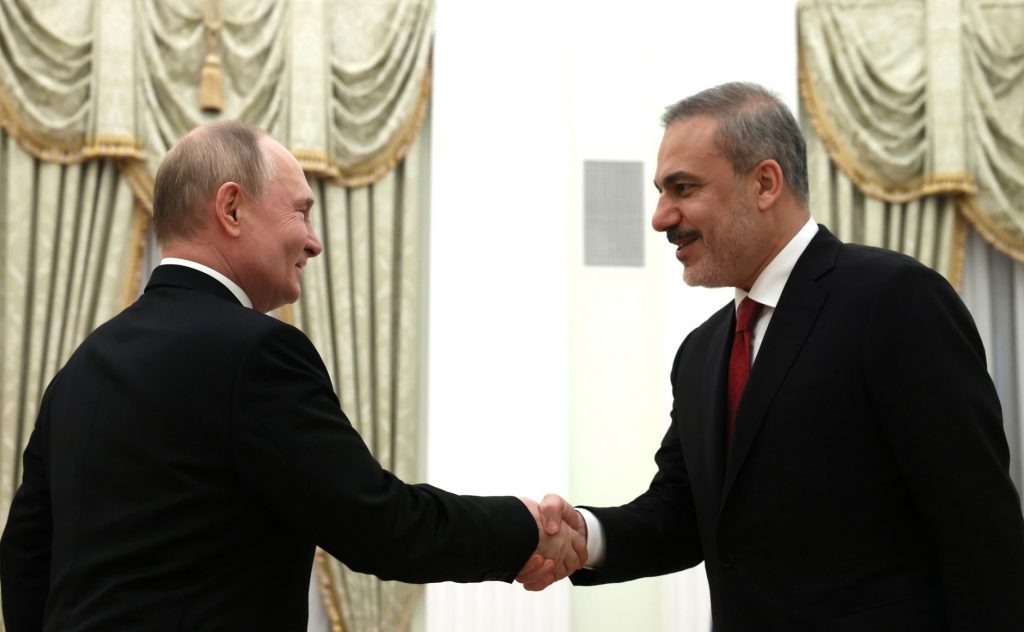
On Tuesday, June 11, Vladimir Putin met in the Kremlin with Turkish Foreign Minister Hakan Fidan, who arrived in Moscow on a working visit. Before that, Fidan visited Nizhny Novgorod, where he held a meeting with the foreign ministers of BRICS member states, timed to coincide with the organization of the future BRICS summit.
During the open part of the communication, the two sides discussed bilateral relations between Turkiye and Russia. However, Ascolta sources note that one of the important topics of the meeting was the issue of Fidan’s participation in the “Peace Summit” as a representative from Turkiye.
Key talking points:
- Putin: “We note with satisfaction the development of relations with the Republic of Turkey. All this is happening, of course, under the leadership and with the direct support of our friend, the President of the Republic of Turkey. Last year we had a good growth, and at the beginning of this year we had a slight decrease in the level of trade turnover, but we attribute this primarily to the adjustment of prices for our main exports and imports. I hope that we will be able to correct this situation in the near future and everything will develop in the same way as last year. And last year there was an absolute record of trade turnover between our countries”.
- Putin: “President Erdogan played a significant role in the conclusion of the so-called grain deal. It is not our fault that, unfortunately, it was not extended. But I also know about President Erdogan’s initiative regarding the situation in the Black Sea. You know, we supported it. But unfortunately, at the last moment, the Ukrainian side also rejected this proposal. Nevertheless, we carefully and with great respect consider all initiatives of the Republic of Turkey on this track and we will remain in contact with you.”
- Putin: “We have played a very significant role together in the settlement of the Syrian crisis, and I think it would be right to continue the Astana format, to fight terrorism, to do everything that depends on us in order for the situation to return to normal in this most important area for us.”
- Fidan: “In your opening speech, you mentioned the mediatory role of our country in the Ukrainian crisis and the Syrian issue. You noted that both leaders are doing their best to stabilize the situation in the region. I held a number of meetings in Moscow, during which we also followed this policy.”
Outcomes/Predictions:
Putin’s (and a little earlier, Sergei Shoigu’s) meeting with Hakan Fidan is a very important moment in relations between Russia and Turkiye. Fidan is an important political figure in modern Turkish politics, second only to Erdogan. For a long time, Fidan has been the head of Turkiye’s intelligence services and, since April last year, of the foreign ministry. He has developed special relations with both the West (especially the UK) and the countries of the Middle East and Central Asia (Azerbaijan, Saudi Arabia, Iran). Recently, relations between Moscow and Ankara have cooled noticeably, which resulted in the cancelation (or postponement) of Putin’s visit to Turkiye. This was caused not least by Ankara’s activity in the South Caucasus and Syria. But it is quite possible that Fidan came to Russia to resolve the issue of normalization of relations. Especially since a few days later Fidan attended the “Peace Summit” in Switzerland and made a speech in which he urged the parties to find a compromise.
Erdogan and Fidan are trying to offer Turkiye as a negotiating platform to resolve the conflict between Ukraine and Russia. And at the same time they are trying to play with both sides by supplying Ukraine with military equipment and Russia with goods, primarily products of the agricultural sector. It is also very important for Russia to understand Turkiye’s position in the situation when the U.S. and EU launch a new sanctions process, which will require Ankara either to stop economic relations with Russia or to switch to a dollar-free basis in settlements.
- Meeting with the Minister of Defense, Chief of the General Staff, and commanders of military districts’ troops
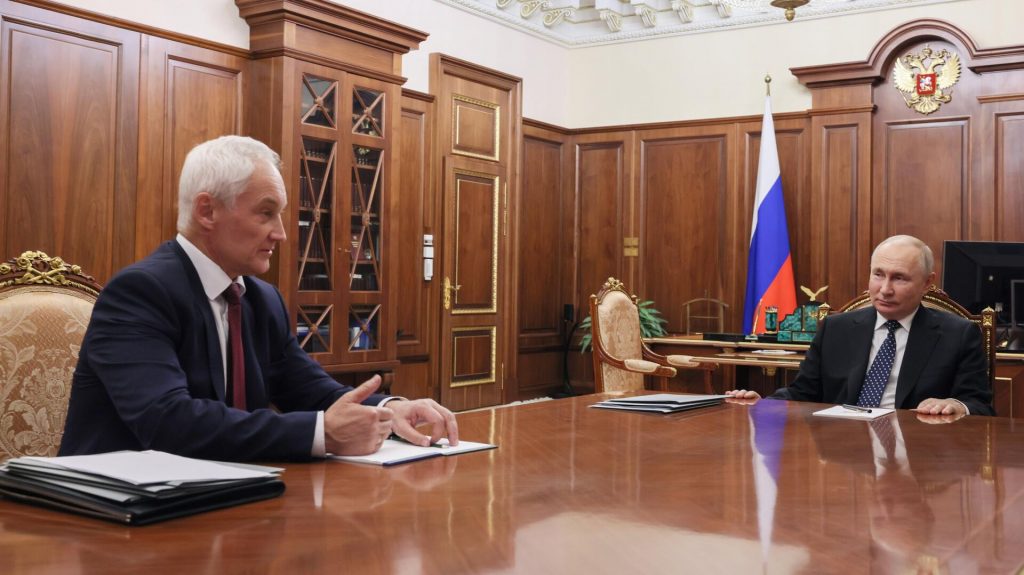
On Tuesday, June 11, Vladimir Putin held a meeting with Defense Minister Andrei Belousov, Chief of the General Staff of the Armed Forces – First Deputy Defense Minister Valery Gerasimov, and commanders of troops of military districts. It is noteworthy that the official press release notes that the meeting itself took place “late at night.” At the same time, no details on the results of the meeting are given.
The press release itself only mentions that the participants of the meeting reported to the Russian president on the progress of the so-called “SWO” as well as plans for the continuation of military operations, after which the president heard from the participants of the event separately.
Outcomes/Predictions:
Putin’s interest in the situation in the war zone is understandable: for him, the success or failure of Russian troops is a factor in weakening or strengthening negotiating positions in the upcoming discussion of the conditions for ending the war. What is important in this situation is that Russia is preparing for a possible counteroffensive by the Ukrainian armed forces, and Putin needs to understand the degree of readiness of certain parts of the front and the possibilities for repulsing the actions of the Ukrainian command. It is also important for him to understand the possible actions of the AFU under the conditions of new equipment and mobilization of human resources. It is not by chance that, according to the latest data, Putin has strengthened the presence of Russian troops in the Ukrainian direction by 250,000-300,000 people, as well as forced the defense sector to work at maximum capacity.
- Telephone conversation between Vladimir Putin and President of Belarus Alexander Lukashenko
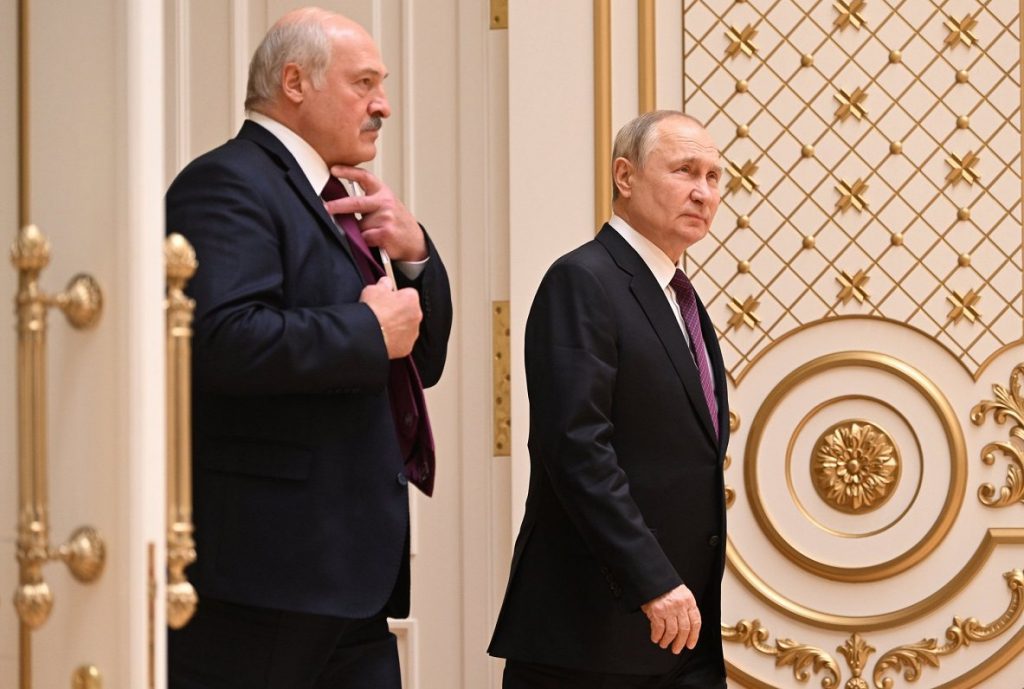
On Wednesday, June 12, Vladimir Putin held a telephone conversation with President of Belarus Alexander Lukashenko. According to the official statements of the parties, the main reason for the conversation was to congratulate all Russians on the state holiday – Russia Day, which is celebrated on this day. It is also noted that during the conversation the parties discussed topical issues of further development of Russian-Belarusian relations, strategic partnership and alliance, taking into account the agreements reached following the summit talks in Minsk on May 24.
Outcomes/Predictions:
Alexander Lukashenko’s call was absolutely ritualistic in nature and was aimed at showing the friendly relations between Minsk and Moscow, as well as paying tribute to his Russian counterpart and the Russian people. Obviously, there were no new initiatives or agreements in principle during the brief congratulatory call – all agreements had already been reached on May 24 and now the process is expected to continue in late June.
- Vladimir Putin’s telephone conversation with Mohammad Mokhber, Acting Chief Executive of the Islamic Republic of Iran
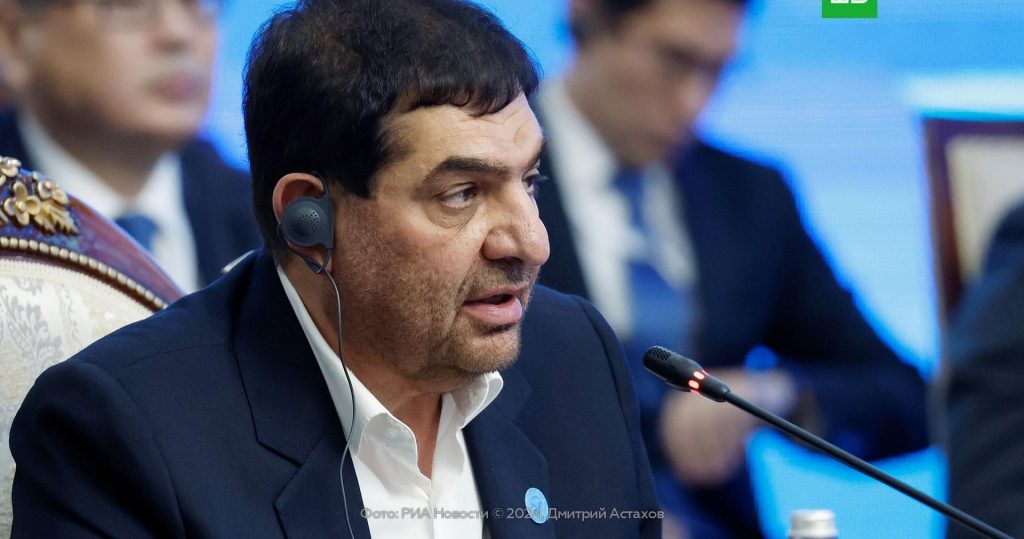
On Thursday, June 13, Vladimir Putin held a telephone conversation with Mohammad Mokhber, Acting Chief Executive of the Islamic Republic of Iran. It is noted that the conversation took place at the initiative of the Iranian side. According to the official press release, the parties expressed mutual interest in further development of Russian-Iranian cooperation, including the implementation of promising joint projects in the spheres of energy and transportation.
During the conversation, the sides also discussed certain issues of interaction in the international arena, including in connection with Russia’s chairmanship in the BRICS association, of which Iran became a full member on January 1, 2024.
Outcomes/Predictions:
It is important for Putin to keep his finger on the pulse of the political processes taking place in Iran in connection with the death of the country’s president and the announced new presidential elections. Russia is extremely interested in Iran continuing the policy that was formed under the late President Raisi. That is why phone calls between Moscow and Tehran, as well as the participation of Russian emissaries disguised as political technologists in Iranian elections have become commonplace. Especially since Iran and Russia have many common plans regarding Central Asia, the Caspian Sea and the Middle East, and Iranian experience of living under Western sanctions is extremely important for Russia in the current environment.
- Vladimir Putin’s meeting with the leadership of the Russian Foreign Ministry
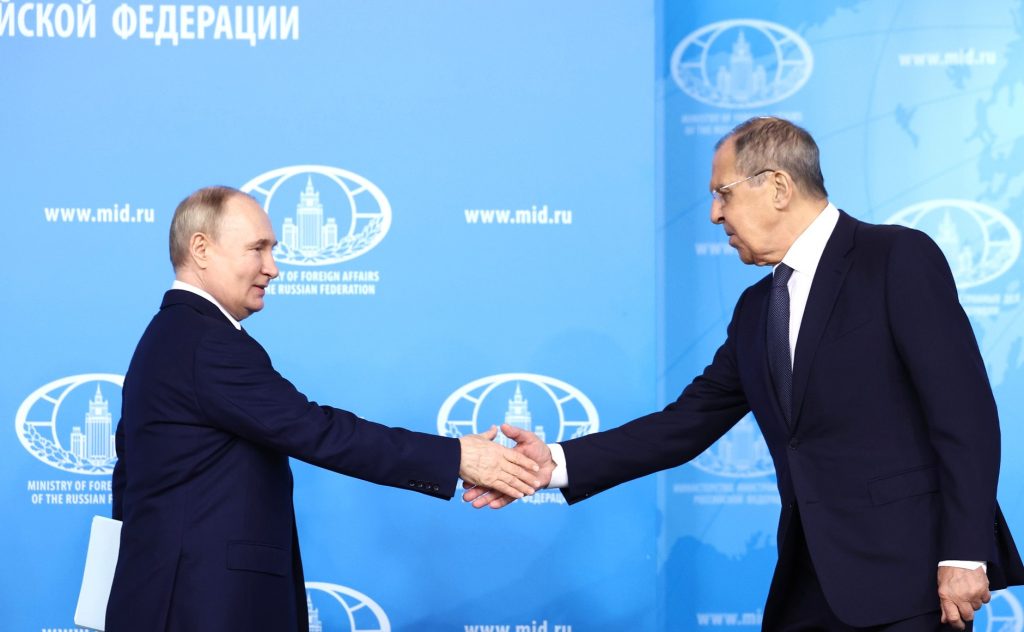
On Friday, June 14, Vladimir Putin held a meeting with the leadership of the Russian Foreign Ministry. During the meeting they discussed Russia’s current geopolitical positions, most of which are fixed in the Foreign Policy Concept of the Russian Federation. At the same time, the most discussed news at the end of the meeting was the Russian president’s announcement of new conditions for the cessation of hostilities on the territory of Ukraine.
Key theses:
- Putin: “In such a broad composition we met with you at the end of 2021, in November. During this time, there have been many pivotal, without exaggeration fateful events both in the country and in the world. Therefore, I believe it is important to assess the current situation in global and regional affairs, as well as to set appropriate tasks for the Foreign Ministry. All of them are subordinated to the main goal: to create conditions for the sustainable development of the country, ensuring its security and improving the well-being of Russian families.”
- Putin: “I repeat: the world is changing rapidly. It will no longer be the same as before, neither in global politics, nor in the economy, nor in technological competition. More and more states are striving to strengthen their sovereignty, self-sufficiency, national and cultural identity. The countries of the global South and East are coming to the forefront, and the role of Africa and Latin America is growing. Since Soviet times, we have always talked about the importance of these regions of the world, but today the dynamics are quite different, and it is becoming noticeable. The pace of transformation in Eurasia, where a number of large-scale integration projects are being actively implemented, has also accelerated.
- Putin: “This image of the future is in line with the aspirations of the absolute majority of the world’s countries. We see this, among other things, in the growing interest in the work of such a universal association as BRICS, based on a special culture of trusting dialog, sovereign equality of participants and respect for each other. Within the framework of the Russian presidency this year, we will facilitate the smooth inclusion of new BRICS members in the working structures of the association.”
- Putin: “The Western powers, led by the United States, believe that they have won the Cold War and have the right to determine for themselves how the world should be organized. The practical expression of this worldview was the project of unlimited expansion of the North Atlantic bloc in space and time, although there were, of course, other ideas on how to ensure security in Europe.”
- Putin: “Our fair questions were answered with excuses in the spirit that no one is going to attack Russia and that NATO expansion is not directed against Russia. The promises made to the Soviet Union and then to Russia in the late 80s and early 90s about not including new members in the bloc were quietly forgotten. And if they even remembered, they sneeringly referred to the fact that these assurances were verbal and therefore non-binding. Both in the 1990s and later, we invariably pointed out the erroneous course chosen by the elites of the West; we did not simply criticize and warn, but offered options, constructive solutions, and emphasized the importance of developing a mechanism for European and world security that would suit everyone – I want to emphasize this, exactly everyone. A simple enumeration of the initiatives that Russia has put forward over the years would take more than one paragraph.
- Putin: “But all of our attempts – and we have made many attempts, I cannot list them all – to talk sense into our interlocutors, explanations, exhortations, warnings, and requests from our side have found no response at all. The Western countries, confident not only in their own rightness, but also in their power, in their ability to impose anything on the rest of the world, simply ignored other opinions. At best, they were supposed to discuss secondary issues, which, in fact, had little to do with anything, or topics that were beneficial only to the West”.
- Putin: “We are talking about formulating in the foreseeable future a contour of equal and indivisible security, mutually beneficial and equal cooperation and development on the Eurasian continent. What is to be done for this purpose and on what principles? First, we need to establish a dialog with all potential participants in this future security system. And first, I ask you to work out the necessary issues with states open to constructive cooperation with Russia.”
- Putin: “Second, it is important to assume that the future security architecture is open to all Eurasian countries that wish to participate in its creation. “For all” means European and NATO countries, of course, too. We live on one continent, no matter what happens, you can’t change the geography, we will have to coexist and work together one way or another”.
- Putin: “Sometimes it seems that the ruling European politicians and representatives of the European bureaucracy are more afraid of falling into Washington’s disfavor than of losing the trust of their own people, their own citizens. The recent elections to the European Parliament also show this. European politicians swallow humiliation, rudeness, and scandals with surveillance of European leaders, while the U.S. simply uses them in its own interests: they force them to buy their expensive gas – by the way, gas is three or four times more expensive in Europe than in the U.S. – or, as now, for example, they demand from European countries to increase arms supplies to Ukraine. By the way, the demands are constant here and there. And sanctions are imposed against them, against economic operators in Europe. They impose them at the drop of a hat, without any hesitation.
- Putin: “Third, in order to promote the idea of a Eurasian security system, it is necessary to significantly intensify the dialogue process between multilateral organizations already working in Eurasia. I am talking primarily about the Union State, the Collective Security Treaty Organization, the Eurasian Economic Union, the Commonwealth of Independent States, and the Shanghai Cooperation Organization.”
- Putin: “Fourth, we believe that the time has come to begin a broad discussion of a new system of bilateral and multilateral guarantees of collective security in Eurasia. At the same time, in the long term, it is necessary to gradually reduce the military presence of external powers in the Eurasian region”.
- Putin: “Fifth, an important part of the Eurasian system of security and development should undoubtedly be the issues of economy, social welfare, integration and mutually beneficial cooperation, the solution of such common problems as overcoming poverty, inequality, climate, ecology, the development of mechanisms to respond to the threats of pandemics and crises in the global economy – everything is important”.
- Putin: “The point of our proposals is to form a system in which all states would be confident in their own security. Then, by the way, we will be able to take a different, really constructive approach to resolving the numerous conflicts that exist today. The problems of deficit of security and mutual trust do not apply only to the Eurasian continent; growing tension is observed everywhere. We see constantly how interconnected and interdependent the world is, and a tragic example for all of us is the Ukrainian crisis, the consequences of which reverberate throughout the planet.
- Putin: “I would like to emphasize once again: Russia did not start the war, it is the “Kiev regime”, I repeat, after the inhabitants of part of Ukraine declared their independence in accordance with international law, started hostilities and continues them. This is aggression if we do not recognize the right of these peoples who lived on these territories to declare their independence. What about it? Then what is it? It is aggression. And those who have been helping the military machine of the Kiev regime all the past years are accomplices of the aggressor.”
- Putin: “Our formations did stand near Kiev, and the military departments and the power bloc had various proposals on options for our possible further actions, but there was no political decision to storm a city of three million people, no matter what anyone says or speculates.”
- Putin: “Strange as it may seem, as a result we did manage to reach agreements that in principle suited both Moscow and Kiev. These agreements were put on paper and initialed in Istanbul by the head of the Ukrainian negotiating delegation. This means that the Kyiv authorities were satisfied with this solution to the issue. The document was called “Treaty on Permanent Neutrality and Security Guarantees for Ukraine”. It was of a compromise nature, but its key points were in line with our principled demands and solved the tasks that were declared to be the main ones, even at the start of a special military operation. Including, as strange as it may seem, I draw your attention to the demilitarization and denazification of Ukraine. And here, too, we have managed to find difficult outcomes. They are complicated, but they were found. Namely, it was meant that the Ukrainian law on the prohibition of Nazi ideology, any of its manifestations, would be adopted. Everything is written there.”
- Putin: “On March 29, 2022, we withdrew our troops from Kiev because we were assured that it was necessary to create the necessary conditions for the completion of the political negotiation process, for the completion of this process. And that it was impossible for one of the parties to sign such agreements, as our Western colleagues used to say, with a gun to its head. Okay, we agreed to that as well.
- Putin: “We can already expect that everything will be reduced to general demagogic talk and a new set of accusations against Russia. The plan is easy to read: to pull in as many states as possible by any means and, as a result, to present the case as if Western recipes and rules are shared by the entire international community, which means that our country must accept them unconditionally. Naturally, as you know, we were not invited to the meeting in Switzerland. In essence, this is not a negotiation, but the desire of a group of countries to continue to push their own line, to solve issues that directly affect our interests and security at their own discretion”.
- Putin: “Please, we are ready. Our conditions for starting such a conversation are simple and boil down to the following. Ukrainian troops must be completely withdrawn from the Donetsk and Luhansk People’s Republics, the Kherson and Zaporizhzhya regions. And, I draw your attention to the fact that it is from the entire territory of these regions within their administrative boundaries, which existed at the time of their entry into Ukraine. As soon as Kyiv declares that it is ready for such a decision and begins the actual withdrawal of troops from these regions, as well as officially notifies of the abandonment of plans to join NATO, an order to cease fire and begin negotiations will follow immediately, literally at the same minute, from our side. I repeat: we will do this immediately. Naturally, at the same time we will guarantee the unimpeded and safe withdrawal of Ukrainian units and formations.”
- Putin: “Of course, we would like to expect that Kiev will make such a decision on withdrawal of troops, on non-aligned status and on the start of dialog with Russia, on which Ukraine’s future existence depends, on its own, based on the current realities and guided by the genuine national interests of the Ukrainian people, and not on Western orders, although there are, of course, great doubts about this,” Putin said.
- Putin: “I believe that Russia is proposing an option that will make it possible to actually end the war in Ukraine, i.e. we call for turning the tragic page of history and, albeit difficult, gradually, step by step, but to start restoring relations of trust and good-neighborliness between Russia and Ukraine and in Europe as a whole.”
Outcomes/Predictions:
Putin has essentially decided to issue a new ultimatum to the West. He is raising the stakes in the diplomatic game. Whereas earlier Putin offered Ukraine’s agreement to lose sovereignty over Crimea and the occupied territories as a condition for peace talks, he now insists that the AFU withdraw beyond the administrative line of Luhansk, Donetsk, Zaporizhzhia and Kherson regions. In parallel, Putin recalled that in March 2022 it was only about recognizing the independence of the so-called “DNR” and “LNR”, as well as guarantees of a land corridor to Crimea. Thus, he makes it clear that Ukraine, dragging out the negotiation process, will face a constant increase in the stakes from Russia.
Obviously, the next claim will be for the Kharkiv region, Odessa or the entire Left Bank. Putin did not choose the time for his speech by chance – on the eve of the “Peace Summit” in Switzerland, to which Russia was not invited. But Putin did his best to make his speech the subject of discussion at the summit. He succeeded, although most of the speakers (including Vladimir Zelensky) assessed this speech in an extremely negative way. In essence, Putin voiced not so much proposals for peace talks or a basis for compromise, but rather an ultimatum to Ukraine and the West on the terms of surrender.

